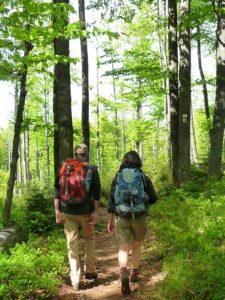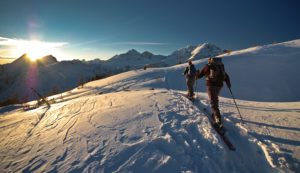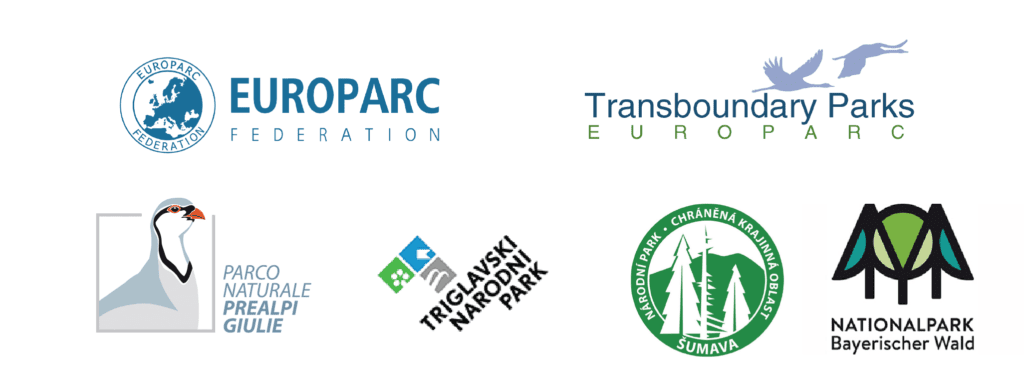EUROPARC Webinar: Visitor Management in Transboundary Parks
26th April – 15:00
Visitor Management in Transboundary Parks
Tourism is a relevant factor in many European Protected Areas, including Transboundary Parks, with major environmental, social, and economic benefits for people and communities in often very remote regions. In this context, cross-border improvements are needed if we are to ensure low impact on protected area resources, benefits for park neighbours and local communities, and at the same time enhance visitors’ experiences.
On this EUROPARC webinar, we will further explore developments in the field of tourism in transboundary protected areas with key actions taking place, for a high-quality, ecologically compatible and environmentally friendly visitor management.
The webinar will be presented by Luís Monteiro, PhD student at the Czech University of Life Sciences with the thesis “Assessing, managing and monitoring tourism and related impacts in protected areas”. In the past, Luis has worked in the Průhonice Park management department, an UNESCO World Heritage Site in the Czech Republic, where he helped to improve the trail system orientation and interpretation programmes. He is member of the Tourism and Protected Areas Specialist Group from the IUCN WCPA and he is currently conducting an internship at the EUROPARC Federation. He will give an introduction and overview to the topic of visitor management and cooperation across borders framed by the Transboundary Parks Programme.
Two case studies from the TransParcNet, EUROPARC’s network of cross-border protected areas, will be presented:

In the Bavarian Forest National Park (Germany), there around 500 kms of marked trails! photo by Maria Husslein
Case Study 1
Plans for a future common visitor monitoring in Bavarian Forest and Šumava National Parks
by Florian Porst, Bavarian Forest National Park, Germany
The area of Šumava and Bavarian Forest National Park is characterised as the largest forest region without human intervention in central Europe. The first Transboundary Certificate between the Bavarian Forest and Šumava National Parks was handed out in 2009.
In the context of an INTERREG (ETZ Bayern-Tschechien) project, both parks will develop a cross border visitor monitoring. The Project runs for a period of three years from 1st January 2017 to 31st December 2019.
Bavarian Forest National Park (DE) has done a basic visitor survey in 2013-2014. Within the project, an equal survey will be done in Šumava National Park (CZ) so it will be possible to compare and merge the data Furthermore, the parks will develop five common survey modules with different themes and each survey will be repeated in a five years regular circle in the future. In addition, it will be established a permanent cross border visitor counting in the whole area of both national parks with automatic counters.
After Studying human geography at Friedrich-Alexander-University Erlangen-Nürnberg (graduation in 2014), Florian Porst started working for the Bavarian Forest National Park Administration in the department of visitor management and visitor information.

Triglav National Park is the only national Park in Slovenia © Triglav NP archive
Case Study 2
Towards a more sustainable tourism in the Julian Alps: Application of the European Charter for Sustainable Tourism in a transboundary area
by Mojca Smolej, Triglav National Park, Slovenia
Cooperation between Prealpi Giulie Nature Park (IT) and Triglav National Park (SL) dates back to 1996, when the Italian park was established. Partnership between the two protected areas was reinforced by EU projects, which supported relationships among cross-border partners.
In 2009, the Transboundary Julian Alps Ecoregion, which also includes Slovenia’s Julian Alps MAB UNESCO Area, was officially awarded the EUROPARC Transboundary Certificate. Last year, the Parks wanted to give a step further in their cooperation, regarding sustainable tourism and visitor management, so they have applied the Charter Methodology and were awarded with the European Charter of Sustainable Tourism in Protected Areas, becoming the first Transboundary Sustainable Destination. Mojca will tell us about their experience in managing tourism across borders and the outcomes of their joint application of the Charter.
Mojca Smolej, is the focal point for Transboundary cooperation in Triglav National Park, for over 10 years. Mojca has been always involved on tourism development: in the creation of info centers, implementation of tourism-related strategies and promotional actions.
Webinar powered by

Special series of EUROPARC Webinars on Sustainable Tourism
As a celebration of the International Year of Sustainable Tourism for Development, declared by the United Nations for 2017, EUROPARC is organising a series of 3 webinars on the topic of Sustainable Tourism in Protected Areas.

We will showcase the important role of Protected Areas in the development of sustainable tourism practices that deliver socio-economic benefits to local communities whilst protecting our natural heritage.
In the 3 webinars, good practices from our network of Sustainable Destinations – that have been awarded with the European Charter for Sustainable Tourism in Protected Areas (ECST) – and from our TransParcNet – the network of Transboundary Parks – will be shared.
We will look at practical examples on visitor management, engagement and cooperation with local partners, and outcomes of the implementation of the ECST methodology in several countries.
April: Visitor Management in Transboundary Parks
May: Engaging with local partners for Sustainable Tourism strategies
June: Sustainable Tourism in Marine Protected Areas